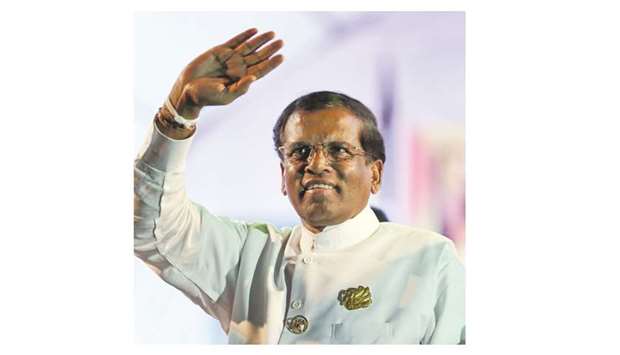Maithripala Sirisena told a convention of his Sri Lanka Freedom Party (SLFP) that he would not allow retired general Jagath Jayasuriya or any war veteran to be tried by any
foreign entity.
A human rights group last week filed two cases in Colombia and Brazil against Jayasuriya, who until recently was Sri Lanka’s ambassador to several South American countries.
The group alleged that Jayasuriya oversaw torture camps and was responsible for disappearances and extrajudicial killings in the final stages of the civil war in 2009 and thereafter.
“The charges against Jagath Jayasuriya is problem beyond our shores,” Sirisena said. “I will not allow anyone in the world to touch Jagath Jayasuriya or any army commander or any war hero.”
The previous Sri Lankan government faced international censure for refusing to acknowledge that civilians were killed while battling Tamil separatists.
However, Sirisena, who came to power in January 2015, has said he was willing to investigate specific allegations of wrongdoing, but maintains he will allow only a domestic inquiry and oppose any foreign investigation.
After taking office, Sirisena appointed Jayasuriya as an ambassador on his retirement from the military. He was promoted to army chief by the previous government barely three months after the war ended in May 2009.
His predecessor in the army, Field Marshal Sarath Fonseka, told reporters in Colombo on Friday that he had received complaints against Jayasuriya, who was placed in charge of arrested rebel suspects during the final phase of the war.
Fonseka added that he was ready to testify against Jayasuriya who had told the local media on Sunday that he had no direct role in combat operations during the final phase of the conflict.
Two days after the South African-based rights group the International Truth and Justice Project filed the cases against Jayasuriya, he left Brazil completing a two-year posting.
International rights groups have said that at least 40,000 ethnic Tamil civilians were killed by security forces while crushing the rebels in the final months of the 37-year civil war.
The UN has estimated that at least 100,000 people were killed between 1972 and 2009.
Tiger rebels have also been accused of using human shields and killing civilians in their guerrilla war for a separate homeland for the minority ethnic Tamil community in the Sinhala majority nation.
Many Sri Lankan military personnel had been accused by rights groups of ordering indiscriminate shelling of hospitals and bombarding civilians.

